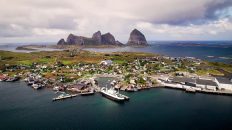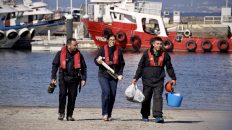In the bustling artisanal port of Nouadhibou, Mauritania, thousands of small fishing boats — pirogues — prepare to return to the sea, as a two-month partial fishing ban ends. This promises a fresh catch of octopus and other local species, providing both income and food for coastal communities.
Mauritania sits atop one of the world’s richest fishing grounds. The East Atlantic waters off its coast attract not just artisanal vessels, but global fleets, bringing economic gains to the nation. Yet, scientists and environmental groups warn that many fish species are being harvested beyond sustainable limits, with some stocks in alarming decline.
Fishermen in Nouadhibou are increasingly anxious. They say that once-abundant fish are now harder to find, forcing small boats to venture farther, using more fuel and taking greater risks.
“We’re scared because there’s nothing in the sea now,” says Moussa Tew, a fisherman who began fishing at 13, and now works on a pirogue with his sons. “You use a lot of fuel, and you earn less money.”
The crisis largely concerns small pelagic fish like sardinella — affordable, nutritious, and essential for millions who rely on them as a primary protein source.
“Our biggest fear is losing our resources, which are vital,” says Mohamed Fadel Ould Soueile, who heads FNPA, the federation representing small-scale fishers. “If there are no more fish, it’s a huge disaster for us.”
Vital stocks hit by fishmeal boom
Climate change is a major factor, but many say industrial fishing vessels, often foreign-owned, pose a more immediate threat. Some of these ships supply Mauritania’s booming fishmeal industry, hauling in hundreds of tonnes in a single day.
“A boat can leave at 8 a.m. and return by 2 p.m. with over 500 tonnes,” says Mohamed Fadel. “This is driven by companies making fishmeal — they want maximum catch.”
Fishmeal, made by drying and grinding fish into powder for uses such as aquaculture feed and fertiliser, has become big business of late. Dozens of factories operate along Mauritania’s coast, demanding huge volumes of fish. Environmental groups have warned that this industry increasingly diverts fish away from local food needs, depleting vulnerable stocks to feed foreign fish and shrimp farms.
Some producers have pledged better practices. The Mauritania Pelagic group, for instance, claims to focus on human consumption, using only discards for fishmeal and oil. Its vessels are certified to international standards, and food-grade catches are frozen to support food security.
Foreign investment in fishmeal can help the country, but only with proper safeguards. According to Sidi Ali Sidi Boubacar of the Ministry of Fisheries and Maritime Economy, in response to overfishing concerns, Mauritania has taken measures that led to reduction of the number of industrial vessels from over 70 to fewer than 15. Some fishmeal factories have closed, and others are being encouraged to install refrigeration to preserve fish for food, not just fishmeal and fish oil.
A European partnership
Balancing economic gains with sustainability, Mauritania has partnered with the European Union under a “Sustainable Fishery Partnership Agreement.” The EU pays €57 million annually for European vessels to access Mauritanian waters, on the condition of taking only surplus stocks.
“It’s this payment that allows European vessels to fish in Mauritanian zones,” explains Joaquin Tasso Vilallonga, the EU’s ambassador to Mauritania. “But it’s also accompanied by sectoral support to strengthen the capacities of Mauritanian institutions to manage the fishing resource sustainably.”
The agreement includes a science-based management plan launched in 2022. It sets quotas, designates no-fishing zones, and establishes closed seasons to allow fish to reproduce. It also addresses fishmeal and freezing practices.
The EU funding supports artisanal fishing and helps upgrade Mauritania’s infrastructure — from ports and coast guard vessels to research labs, nature parks, and fish markets.
The stakes are high. Fishing represents over a third of Mauritania’s exports and a quarter of government revenue. The industry supports as many as 300,000 jobs, directly and indirectly.
Because fish migrate along the West African coast, Mauritania’s success depends on broader regional cooperation. Scientists are recommending harmonised management across borders.
Researchers at IMROP, Mauritania’s oceanographic institute, report that some fish stocks are now recovering under the new plan, though others remain critically depleted. Scientists call for a 60% reduction in fish mortality to allow full recovery. This means fewer boats, shorter seasons, and tighter enforcement – not an easy task for a region where fishing underpins both food and income.
Mauritania has few alternatives to relying on its marine resources — but the lives of future generations depend on keeping this vital treasure safe.





